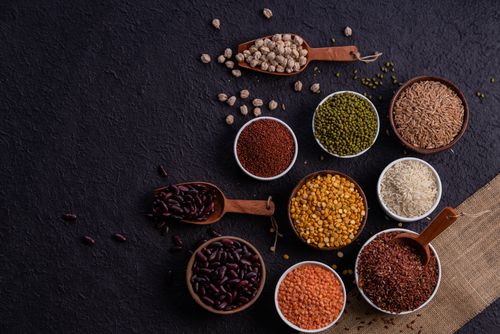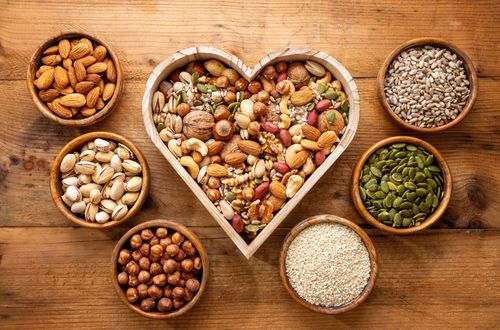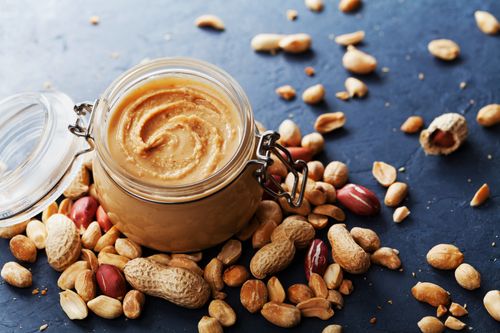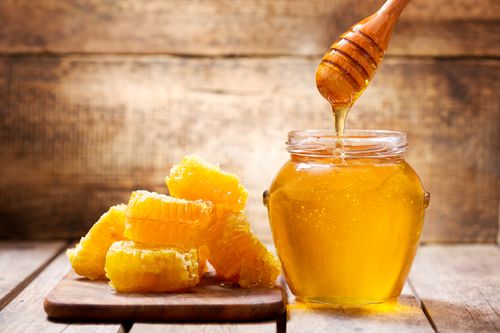Healthy Grocery to Stock up on During the Second Wave of Covid-19
Use this shopping list of fresh, frozen, and dried food items to stock up for surviving the second lockdown due to the second wave of COVID-19.
The coronavirus pandemic taught us a lot about the need to prepare for an emergency. As COVID-19 cases continue to rise, people are scrambling to stock up on essentials that will be needed to survive if there is a lockdown once again. We suggest you buy accordingly and refrain from over-buying.
To prevent frequent trips to the grocery store, it will be helpful to have a stockpile of healthy food items which can be used to whip up quick and nutritious meals for you and your family.
10 Foods you must stock up on during the second wave of COVID-19
#1 Whole grains
Whole grains like oats, millets, brown rice, whole wheat pasta, no sugar muesli which are easy to cook and stay for a longer time. Whole grains are also rich in fiber, vitamins and minerals.
#2 Pulses and dals
Pulses and dals also have a longer shelf life and provide protein to maintain energy levels and to prevent muscle breakdown. Mung dal is a dal that one should stock up as it is not only nutritious but easy to digest and can be easily boiled and added to soups, salads or made into healthy and nourishing khichdi!
#3 Dried fruits
Dried fruits such as dates, figs, dried berries are perfect snack options. They also provide fibre and antioxidants to maintain immunity.
#4 Nuts and seeds
Nuts and seeds are great for snacking or late night bingeing during the lockdown. Rich in healthy fats and fibre, these are also great for gut health. You can also add nuts in smoothies, salads, or munch as a snack. Nut milks can be used in place of dairy and stored in the fridge.
#5 Dairy
Dairy food items like milk, curd, and paneer provide good quality protein and are important for immunity. We can choose shelf-stable Tetra Pak milk, as it has a longer shelf life. Paneer can be frozen and used as and when needed in curries, sandwiches, or stuffed rotis.
#6 Frozen vegetables
Frozen vegetables such as peas, carrots, corn can be stored and conveniently used to make sabjis if fresh vegetables are not readily available. Freezing veggies still retain most of their nutrient content. Choose frozen veggies without any added sauces.
#7 Eggs
Eggs can be stored easily and whipped up into any meal or snack. Eggs provide quality protein as well as vitamins and minerals to stay fit during the pandemic.
#8 Nut butters
Nut butters such as peanut butter is a great shelf-stable protein source, especially for vegetarians and vegans. There are many ways to use it in both sweet and savory dishes, in smoothies, in dips or spread on a sandwich or a roti roll.
#9 Herbs and spices
Superfoods such as ginger, garlic, tulsi leaves, curry leaves, turmeric and cinnamon. These are potent antibacterial, antiviral as well as anti- inflammatory, and that help the body combat infections. Use herbs and spices in the form of tea, spice powder, or add to soups, broths and curries.
#10 Unpasteurised raw honey
Many studies have demonstrated the broad-spectrum antimicrobial effect of honey as an antibacterial, antifungal, antiviral and antimycobacterial. Therefore, natural honey is a great addition to the pantry in this pandemic. Add honey to warm water or add to turmeric milk daily.
Conclusion
We should all try to limit our visits to the markets and local grocery stores as much as possible. And we can do this by preparing a careful list of all the foods you might need in the coming weeks.
There are two criteria that you can apply while creating a list of foods:
1. Foods that have a high nutritional value
2. Foods that are non-perishable and last for at least 2-3 weeks
Stay home, stay safe, and stay fit!
Frequently Asked Questions (FAQs)
A. Include whole foods like whole grains, pulses, dark leafy greens, oranges and tomatoes and even fresh herbs which are loaded with vitamins, fiber and minerals. Make it a habit to try to eat more whole nutritious foods and snacks like nuts and seeds instead of processed snacks or fast food like cookies, cakes and colas. Preparation and storing the right food is the key.
A. There is currently no evidence that people can get COVID-19 from food, including fruits and vegetables. Fresh fruits and vegetables if available are rich in nutrients and should be a part of daily diet. Ensure the fresh produce is washed thoroughly if you are eating it raw.
A. Avoid processed, baked, and fried foods that contain industrially produced trans-fat. Avoid packaged foods which contain excess salt and sugar as these can weaken the immune system.
Choose white meats like poultry and fish, which are generally lower in fats than red meat. Try steaming or boiling instead of frying food when cooking. Limit intake of sweets and sugary drinks. Choose fresh fruits instead of sweet snacks such as cookies, cakes and chocolate.






